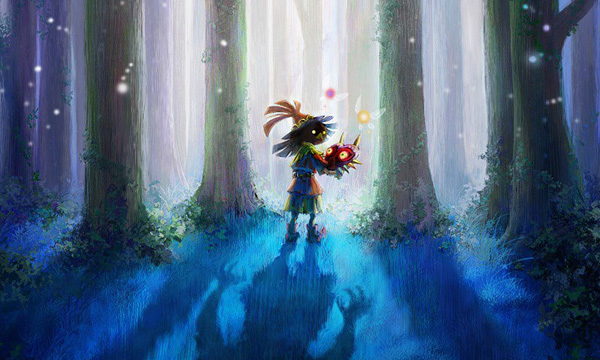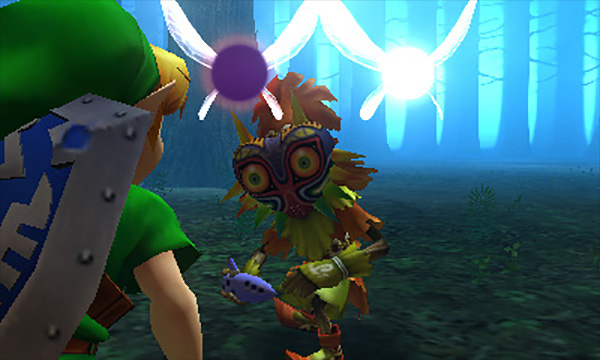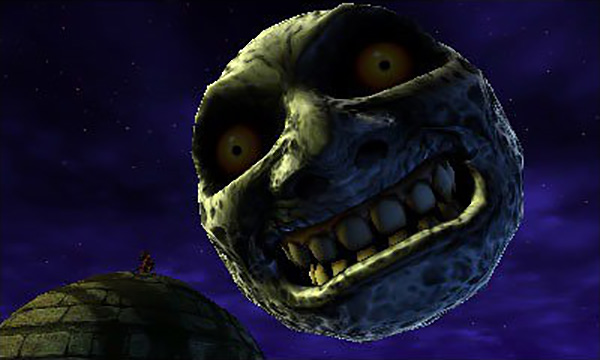
The Legend of Zelda series is one I've had a chequered history with. I've always respected the series, but upon playing the games very few have been able to warm my heart, so it was only natural for me to approach Majora's Mask with as much trepidation as I did. And while Majora's Mask doesn't leave me wanting more Zelda, it did manage to crack my hardened exterior and allow me to appreciate it for what it is. Termina is full to the brim with atmosphere and character unlike any other game in the series. Majora's Mask has you constantly on edge for all the right reasons — I mean, I'll never look at the moon the same way again. Clock Town is full of wonderful NPCs whose lives are intricately tied up with the world Link is thrust into, and the time mechanic and this central hub alone makes Majora's Mask worth playing. It's almost a shame to leave Clock Town and embark on your typical Zelda-fare adventure.
I feel like the game never pushes the boundaries through its gameplay, and as a result, I found myself flagging through the latter stages of Link's quest. I wanted to spend more time in Clock Town rather than redirect the flow of water numerous times in the Great Bay Temple. The addition of masks were the only real point of interest for me here. I never got tired of running around with the Bunny Hood. I'd love to see these come back in some way in the series. Even though I struggle to enjoy most Zelda games, Majora's Mask has been a worthwhile experience, and while I'll probably never revisit it, I'm thankful I made the effort to play it. The sidequests, atmosphere and world of Termina have been a creepy experience I won't soon forget. And with Breath of the Wild looking to take the series in a much-needed new direction, I have high hopes for the future of the series and will continue appreciating it from afar.

As a kid I didn't quite understand this game and I found it quite intimidating. A malevolent moon looms in the sky above threatening an entire world, and you have three days to save it. Perhaps the most subtle plot-twist here is that you don't make it, and quite frankly you don't actually meet this literal 'dead-line' quite often. For a game structured around numerous ways of looking into death, despair, and desperation I'd argue this is a Zelda game not necessarily meant for kids. Not because of its content (though I'm sure ReDeads can terrify anyone young or old), but thematically I think it can affect older players with how surprisingly vivid it is about what it needs to talk about; it's rare for a Nintendo title let alone a Zelda game.
Majora's Mask stands as an intimidating installment, it is not an easy or light-hearted game as other Zelda titles may be. That said, it is without a doubt one of the most rewarding titles in this series and a fantastic display of how well The Legend of Zelda series can play without needing its red-headed antagonist or titular princess.

The world is about to end and there is nothing you can do to stop it. What is a hero to do? Simple really! The answer is to go back in time and relieve the same three days again and again and again. And again, until all the wrongs of the world of Termina have been righted and the power of the Majora's Mask can be quelled. That is the core loop of Majora's Mask, and the result of this obtuse premise is an incredibly quirky and somber journey. Majora's Mask is a game about death: Time is of the essence, and the clock in the center of Clock Town constantly ticks down the hours till the world's demise. Death is the one constant in the world of Termina, represented by a menacing moon that looms large over Clock Town (with a face that is pure nightmare fuel). The end is always nigh, pushing you to tie up any loose ends in a given quest before playing the Song of Time and starting the anxiety-fueled three day journey again. And those loose ends are what kept me coming back. More than any other Zelda I've played, Termina is populated with wonderful NPCs, and their associated quest lines range from hilarious to heartbreaking. Hunting down obscure masks becomes an absolute joy, and each new mask brings with it a new mechanic to indulge in. And the stories around the three core masks are fantastic (as well as the horrific transformations that accompany them). But while the world of Termina charms you with its various mysteries, its dungeons are some of the Zelda series' most lackluster Temples. And that is the strangest part about this adventure: Dungeons are supposed to be the main part of any Zelda title, but here they are the least compelling element (except for the Stone Temple which is rad).
But I don't regret any of the time I spent in Termina. I don't know if I'll ever return to this corner of the Zelda universe, but I can and do recommend this journey to even the most passive Zelda fan: Creativity mixed with crazy usually isn't this compelling and wonderful.

On Retro Encounter I have been very forthright with my history and overall feelings on the Zelda franchise. As someone who has never beaten a Zelda game, I felt there was a massive hole in my overall game knowledge that could finally be resolved by playing Majora's Mask for the podcast.
Everything was interesting in the beginning; An intriguing time mechanic, a whimsical yet dark world, entertaining dungeons and puzzles, and a decent plot were all major pluses to my opinion of Majora's Mask. However, as time went on, what was compelling slowly turned into tedious as the game focused on repetition and unnecessary fluff to pad the game. Gone were the dynamic puzzles that won me over, replaced by encounters that I was forced to slog through.
Overall, I am super happy to have finally finished a Zelda game and feel that I have a greater understanding for why people enjoy the series. I think Majora's Mask proved to me that they are great games, just not games that I am interested in playing.